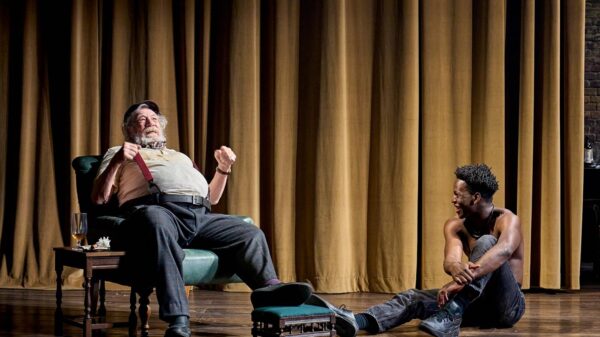Staff Writer Anwesh Banerjee reviews the recent adaptation of Harold Pinter’s ‘The Homecoming’ directed by Matthew Dunster.
The difficulty in writing about a play like The Homecoming is two-fold. Matthew Dunster, who faithfully adapts Harold Pinter’s 1965 source material, is a director of immense repute in London, having previously worked with companies as big as the National Theatre and the Royal Shakespeare Company. Dunster’s production is technically sound, with period-appropriate set-design, a thoroughly well-cast performance and impeccable usage of diegetic music and light that imbues this kitchen-sink, naturalist text with a much needed breath of expressionism. On the flip side, there is the source material by Pinter himself which, despite its chamber-room deep-dive into the heart of misogyny and patriarchy, is provocative – to the point of being borderline repulsive. The question that hence arises does pose a simple answer because how do you write about a play that boasts of top-notch production values, but is centered on a story that you simply cannot like?
Dunster’s adaptation, playing at the downstairs area theatre of the Young Vic, is set in North London and follows the “homecoming” of Teddy (Robert Emms) as he returns unannounced after many years, with his mysterious wife Ruth (played with curious restraint by Lisa Diveney). The house, they return to, is currently occupied by Teddy’s cantankerous, geriatric father Max (played to stunning perfection by a majestic Jared Harris), his doting and maternal brother Sam (played by the sublime Nicolas Tennant) and his two younger sons Lenny (a riotous Joe Cole) and Joey (David Angland).

Pinter’s text is a classic examination of the psychic as well as physical trappings of a patriarchal institution. The home as we know it, in the absence of a matriarch, quickly turns into a seeming prison, where fragile egos collide against each other in a routine fashion. The violence never actually occurs on stage – it is sub-textual and almost psychological, as these men continue to go about their lives engaging in a phenomenal game of one-upmanship and absolute nonchalance for the cruelty that they inflict on each other. There is an air of loneliness about their lives, where their lack of alone-ness only seems to heighten – but Pinter or Dunster seem unbothered by these possibilities, which are only suggested by the text. Instead it is the very normalised, almost institutional violence of patriarchy that they choose to focus on — which also gets disrupted by the arrival of Ruth. Her very being, turned frigid by the drab domesticity of life as the wife of an American academic, brings her to the brink of making a choice that will alter her life, as well the lives of those around her. It truly is her coming into her own that we are witnessing.
All this sounds thrilling on paper, and situating this play too in a historic literary tradition that has seen burning hot domestic dramas from the likes of Tennessee Williams and Henrik Ibsen, should naturally make one expect a narrative that is searing, scarring and shocking. Unfortunately, The Homecoming does none of the above. While one stands to laud him for the panache with which he weaves ambiguity into his narratives, offering character arcs with the sparest of prose, one also cannot help but start to feel frustrated for the lack of a plot. Ruth’s initial seduction of Lenny is sprung on us with such lack of context that the scene barely registers. Despite the best efforts of the actors, the scene is just not sparkling enough, and the impact is lost long before the scene draws to a close. We are told, or rather shown, things that the characters have done or do. But the information is thrown in such casual passing that some of it barely registers. There is the mention of Max having served in the Italian campaign of the war, of the fact that Lenny has multiple “flats” in the city and that Ruth had a career in modelling prior to her marriage. But these plot points are never developed any further and the script simply keeps jutting from one dialogue to the next, with barely any space for contemplation or reflection.

The final conceit does not help either. Ruth’s decision to stay back in the London apartment, thereby indenting the patriarchal household on her own terms is yet another addition to the long canon of texts and thinkers who argue for female sex work as a site of liberation. It is an argument that is inherently flawed and further complicated by the fact that this is a performance being viewed in the post-MeToo digital world, where questions of agency, authority and consent are beyond liberal straight-jacketing. As the viewers are subjected to the final, quietly gruesome image of Ruth resting on the armchair with the men either resting in her lap or around her, the Oedipal implications of the drama become even clearer. Pinter is not simply interested in provoking, he deliberately chooses to make you uncomfortable, and that, in this particular thematic context might not be the best thing ever.
This brings us to the larger question of the relevance of a production like this. Dunster is extremely faithful to his source material, except the use of harsh, almost guttural jazz music which smoothly transitions one scene to the next. The use of spotlights is also a fantastic idea, as seen in one particular scene where a stray piece of dialogue between Lenny and Max, about being disciplined by the stick, gets heightened with a sudden harsh spot on Lenny’s traumatised face and the diegetic insertion of cymbals crashing. Or the decision to open the second act in darkness, as the men light their cigars in what is a deliciously framed phallic joke, as we see the men only in the reflected light of the fire they use to light their tobacco with. But despite the period appropriate use of vinyl records, the decision to stage this play in an arena theatre as opposed to a proscenium theatre turns out to be one of the production’s biggest misfires. There is a burgeoning sense of acute claustrophobia in the story, or the lack of it, but we as an audience never are able to feel it. There is way too much breathing space, physically, and although the actors try their absolute best to make this appear like an intimate peek into the lives of these characters, it comes at the cost of losing the caustic sensation of being stifled in a closed space that seems necessary to a drama of this stature.

While without doubt, Pinter is one of the most important playwrights of the last century, any revisiting of his works needs to be prepared to answer the subsequent questions of his relevance to the modern cultural milieu. With plays like the menacingly absurd The Birthday Party and jaw-dropping, yet moving Betrayal, Dunster’s decision to revisit this extremely controversial piece of work by Pinter will surely divide viewers. Some will applaud the bold, almost surreal take on female agency (driven by a heavy male gaze) and some will only be unsettled by the implications of the play’s disturbing second act. I unfortunately am part of the latter camp, and by the end of the often frustrating two-hour run-time, I just wanted to borrow a puff from one of the hundred cigarettes the actors smoke on stage throughout the play.
The Homecoming is playing at the Old Vic till January 27, 2024.
A graduate of contemporary literature, culture and theory from King's College London, Anwesh was nominated as one of the Best Culture Writers in the UK by the National Student Publishing Association in 2024, in the category's inception year. An aspiring magazine editor and novelist, Anwesh has written for publications like Vogue India, Strand Magazine The Indian Express and Film Companion. When not binging Netflix, he can be found sitting in bookshop corners, reading essays off The New Yorker.

















